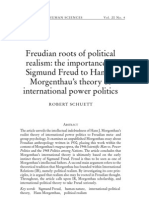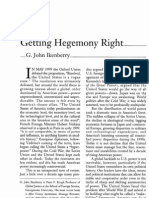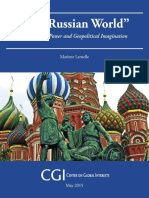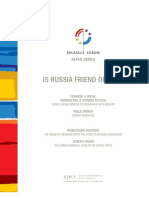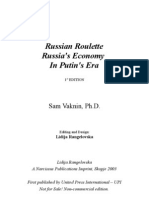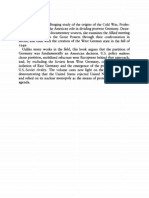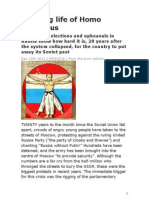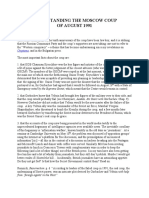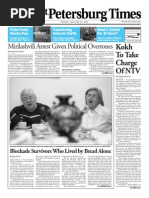Russia Stephen Cohen
Russia Stephen Cohen
Uploaded by
LarryDUCopyright:
Available Formats
Russia Stephen Cohen
Russia Stephen Cohen
Uploaded by
LarryDUCopyright
Available Formats
Share this document
Did you find this document useful?
Is this content inappropriate?
Copyright:
Available Formats
Russia Stephen Cohen
Russia Stephen Cohen
Uploaded by
LarryDUCopyright:
Available Formats
Blaming Russia First
Stephen F. Cohen, Failed Crusade: America and the Tragedy of Post-Communist Russia, Norton. Chrystia Freeland, Sale of the Century: Russias Wild Ride From Communism to Capitalism, Crown Business. Paul Klebnikov, Godfather of the Kremlin: Boris Berezovsky and the Looting of Russia, Harcourt.
Pity the unpopular Russians! In July, Mexico elects its first president from outside the countrys ruling party, and The Economist magazine labels it a real democracy. Russia elects a president from the political opposition in 1991, then holds no fewer than five competitive, generally free national elections in the following years. The Economist labels it a phoney democracy. Colombia has a problem with organized crime, and Washington gives its government $1.3 billion to help fight the drug lords. Russia has a problem with organized crime, and American politicians lecture Moscow sternly not to expect any more aid until it cleans up its act. An American bank is accused of laundering money for Russian organized crime figures, and a leading senator accuses the Russian government of being the worlds most virulent kleptocracy. An undercover Customs Service operation finds several Mexican banks laundering drug money in the US, and Washington apologizes to the Mexicans for conducting undercover operations on their territory. When the Asian crisis scares foreign investors away from the Russian market
and the ruble collapses, commentators declare this proof of the failure of liberal economic reform in Russia. When the Asian crisis scares investors away from the Brazilian market and the real collapses, commentators declare this a bump in the road. Perhaps it is not altogether surprising that many Russians these days see a double standard in Western opinion toward their country. As readers of the Western press know, there are no businessmen in Russia, only mafiosi; no democrats, only corrupt politicians; no citizens, only an impoverished, nationalistic mass. Members of the emerging Russian middle class are often discouraged to learn, on picking up the Western papers, that they do not yet exist. It has not always been this way. As Stephen Cohen points out in his new book, the Western press was overwhelmingly supportive of Boris Yeltsin and his attempts at reform in the early 1990s. Around 1998, a sea-change occurred. As Cohen points out, editorials before and after the financial crisis of August 1998 make amusing reading. The scales fall from the editorialists eyes. Without acknowledging any change of position, they switch from a guarded optimism about Russias reforms to a withering condemnation of all associated with them. Political and economic developments in Russia in recent years have certainly been disappointing. It is fashionable to point this out. But the current gloom about Russia is as overdone as the nave optimism of the early 1990s. The obstacles in the way of full democracy and well-functioning markets have always been extremely forbidding but not unsurpassable. Successes have always mixed with failures, good with bad. Perhaps Western opinion will eventually come to recognize this, but at the moment the frustrations of the nave optimists are joining up with the schadenfreude of the confirmed
pessimists to produce a public discourse on Russia that is dyspeptic, often hypocritical, and almost completely lacking in comparative perspective. These two books, in different ways and to different degrees, illustrate this. What the nave optimists and the confirmed pessimists have in common is the hunger for a villain, the urge to cast Russia in the 1990s as a simple morality tale, of good and evil individuals, of promise and betrayal. They tend to differ in whom they cast in the role of villain, but the structure of the arguments they construct is similar. Stephen Cohen, a professor of Russian studies and history at New York University, has been a confirmed pessimist since before it became fashionable. His analysis of Russia in the 1990s is simple and, since he repeats it verbatim many times throughout his new book, easy to follow. The Soviet Union as of 1991, he argues, was a successfully reforming state. Most of the essential social and economic institutions were still intact. This functioning system was destroyed by a crusade mounted by American political leaders to transform post-Communist Russia into a replica of America. The missionaries and evangelists in this crusade were so-called economic advisers, usually from Harvard or the IMF. This invasion of Western crusaders preaching tightfisted monetarism resulted in the impoverishment of the Russian population, a drastic fall in life expectancy, and the demodernization of a twentieth-century country. By letting Jeffrey Sachs and others of his ilk swarm across the Russian plains, the Clinton Administration has done more damage to US interests than the war in Vietnam. I have to admit I got quite a frisson from reading this, with its dramatic language and unabashed quality of Old Testament wrath. Other readers may enjoy it for the same
reason. But as an account of Russia in the 1990s, the argument hasto say the leasta few lacunae. Perhaps oddest of all is the suggestion that the Soviet Union in late 1991 was a well-functioning, reforming state. To anyone who spent time in Russia that year, this claim is completely surreal. By fall, even in privileged Moscow people were standing in line for hours to buy bread. The elite stores, Chrystia Freeland tells us in her book, had little to offer their nomenklatura clientele but bags of millet. Only four months of grain reserves remained, and there was a widespread fear of famine that winter. Before Yeltsins reformers even touched the controls, Soviet industrial output fell by 17 percent in 1991. Even before price liberalization, inflation in Russia in 1991 was more than 160 percent. Russias general government deficit (including import subsidies and extrabudgetary funds) was almost one third of GDP. The central planning and supply system had been decimated by Gorbachevs perestroika, and enterprise directors were stripping assets with abandon via the semi-private cooperatives that Gorbachev had legalized. Though they sounded bold, the dramatic reforms of late 1991 and early 1992 freeing prices, liberalizing trade, initiating privatizationwere actually a brave face put on the central states alarming impotence. Yeltsins lieutenants might have tried to hold off freeing prices and privatization for another year or two, as Ukraine did. But Ukraines subsequent inflation and asset stripping were even more severe than Russias. There was certainly an element of economic dogma in the Gaidar governments policiesand a strong one in the way they were presentedbut there was a much more important element of desperation.
Were these policies imposed from outside by the crusaders from Harvard and the IMF? The image of Jeffrey Sachs waltzing into the Kremlin to preach the true gospel of Friedrich Hayek is a romantic one. But, with great respect for Professor Sachs, few who have met him would think to cast him in the role of the Pied Piper of Hamlin. He is smart enough and articulate, but there cannot be many Russian children who would follow him over a cliff because of the beautiful tunes he knows how to whistle. Besides, the Russian leaders were grownups. Gaidar had read Adam Smith and Samuelsons economics text long before the Harvardites came to call. Yeltsin, though anxious for Western respectability, was first and foremost a politician; he was won over to the gospel of monetarism for little more than an afternoon. (In fairness, I should disclose that I was part of a team advising the Russians on tax reform in 1997, and Cohen will no doubt take me for a partisan in the crusade. I spent a summer suggesting such revolutionary changes as the geographical rotation of regional tax chiefs to reduce corrupt ties. Does this qualify as an attempt to turn Russia into a replica of the US? I did not think so at the time, but there may be other opinions.) Particularly troubling in Cohens interpretation, the Pied Pipers from Harvard apparently brainwashed not just the Russian leadership but much of the countrys population. As he points out, there were alternative economic programs, for instance those of the Communists. But majorities of the voters repeatedly rejected candidates who espoused such programs. From April 1993when, to observers surprise, 53 percent of voters said in a referendum that they supported Yeltsins social and economic policies to the presidential election of March 2000, anti-reform politicians and their positions have been consistently defeated at the polls. Cohen rightly points out that the media were often
biased and manipulative, but former Soviet citizens are used to reading between the lines. Similar pro-incumbent PR attacks backfired in 1993 and 1995, when the parties of power under Gaidar and then Chernomyrdin failed to get even 20 percent. And, despite minor falsification, even Cohen notes that in 1996 no serious observers doubted that Yeltsin had actually won. Yet, if voters chose such candidates knowing the economic policies they favoredin all cases except perhaps that of Putin they clearly didand those involved were adults who could reason for themselves, what do the snake-oil salesmen from Harvard really have to do with it? Were they mass hypnotists as well as economic missionaries? Were Russians too young and gullible to be trusted with democracy? There is also something vaguely undemocratic about the demand Cohen makes at the end of the book that the US change tack and organize an international coalition to provide Russia with $500 billion in aid. (He says he got this figure from a Russian economist admired for his moderation and good sense.) I actually agree with him that it would be wise for Western nations to invest more in preventing instability in the worlds second nuclear power. But the public in the USand, I think, in other Western countrieshas made it absolutely clear in polls that, while it might be persuaded to spend somewhat more on foreign aid, it rejects anything approaching this figure. Should the Clinton administration and Congress be faulted morally for not doing what the citizens who elected them explicitly do not want them to do? As for the demodernization of Russia, the economic shock in the 1990s was undeniably severe. But demodernization? Consider a few statistics. Industrial output has fallen sharply. However, car ownership more than doubled between 1990 and 1998. In
1990, about one in six Russian families had a car; in 1998, about one in three did. (Nor was this just in the big cities: even in impoverished, distant Chukotka, car ownership doubled.) In the same eight years, an additional 32,000 km of road was built. Access to home telephones increased by 40 percent, and the number of international telephone calls grew by 12 times. The share of the population with access to three or more tv channels increased from 36 to 68 percent. Infant mortality, after rising in the early 1990s, was lower in 1998 than at the beginning of the decade. Such statistics are the domain of economists, and Cohen makes clear he is neither an economist nor an adviser, (though he seems nevertheless to have quite a bit of advice to offer.) He is a historian, and feels that a sense of history has been missing from the discourse on Russia. Though it is no longer fashionable to say so in the social sciences political, economic, and social realities are shaped by a historical process. Being a historian seems to mean to him in this context emphasizing continuityRussia cannot jump out of its skinand reminding the reader of Russias authoritarian traditions and lack of experience with private property. But it is not clear quite what he means practical politicians to do with this knowledge. In the latter case, he seems to be saying that Western policy should support reform plans that aim at a mixed economy rather than advocating American style liberalism. But I do not think he means that Western politicians should also favor traditional authoritarian institutions in Russia rather than democracy. Cohen is good at skewering journalists who muff their facts when racing for deadlines and take their opinions from the herd. It is entertaining, in a sadistic sort of way, to see him give the poor hacks a good poke in the eye. (He butters them up in
advance in the introduction by recalling that he once turned down a job as Moscow correspondent.) Stupidities were uttered and written by many people including key Russian reformers and their Western advisers. Cohen does a good job of collecting them. But leaving aside such dubious pleasures and the excitement of overheated rhetoric, this is pretty arid stuff. The book contains almost no direct descriptions of things Cohen has seen in Russia, conversations with individuals (the exception is Mikhail Gorbachev, who does get a few direct quotes.) After many allusions to every political figure we met, most Russian foreign policy specialists and so on, one longs for a concrete name, face, story. Nor are there anecdotes or comparisons from Russian history, except at the level of brief allusion to Russias time of troubles. The same clichs turn up in chapter after chapter. One winces on being told for the ninth time about Russias accursed question Who is to blame? (pp.38, 43, 61, 83, 118, 133, 139, 160, 172) The argument itself does not develop: almost all the essential points of his condemnation of the Russian reformers and their Western supporters appear already in an article he reprints from March 1992, just a few months after the reformers entered office. I think Cohen views this as evidence of prescience, but there are other interpretations. In the end, the book makes depressing reading, though not for the reasons Cohen imagines. Its author is a scholar of undeniable talent, who published the best book around on Bukharin. For a generation of younger Russia specialists, myself included, his writings on the Brezhnev and early Gorbachev periods were an inspiration. Unlike many, he was able to see the change under the surface, the hidden vibrancy of late Soviet society. He is clearly sincere in his concern for Russia and the Russians. There were many ways he
could have used his impressive gifts to illuminate Russias evolution during the last ten years. One might have expected more than the book he ended up writing.
To characterize Chrystia Freeland as a nave optimist is a little unfairshe is much smarter than that label suggests. But she did go to Russia with high hopes, and her narrative is colored by obvious frustration at seeing them disappointed. Sale of the Century is a very different sort of book from Cohens. Its author was the Financial Times Moscow bureau chief from 1995 to 1998, and reported from Kiev before that. Her account is well-written and lively, and one has to be impressed by the energy with which its author pursued and cultivated a large selection of the leading economists, politicians, and businessmen of fin-de-sicle Moscow. There are wonderful vignettes of the main oligarchs, and a few fascinating glimpses of ordinary Russians. In a memorable aside, she notes that what struck her about the so-called oligarchs, what they all had in common, was not their Rolexes and wives $100,000 fur coats, but the fact that they all seemed scared. The reporting is generally excellent, vivid and colorful, leavened with some stories that even close Russia watchers will not have heard. Occasionally I wished that sources were more clearly provided. Some anecdotes seem to be taken directly from the embittered memoir of Yeltsins disgraced bodyguard, Aleksandr Korzhakov, a book that Freeland herself describes as scurrilous. I assume she has a second, more reliable source, but this is not made clear. The occasional error creeps in. Cohen has particular scorn for those who mix up the USSR Supreme Soviet with the Russian Supreme Soviet, and Freeland appears to oblige on p.57. But these are quibbles.
Where the book is less successful is in its analysis. Again, the desire to reduce Russian events to a simple morality tale seems to take over. In this version, the villain has changed. Instead of the snake-oil salesmen from Harvard, Freeland blames the oligarchs for Russias misfortunes. Her book, she writes, is the story of Russias capitalist revolution and of how that revolution was betrayed. [A]t one crucial moment, the Kremlin consciously and of its own free will took a disastrously wrong turn that moment came when the government made a private pact with a group of upstart capitalist entrepreneurs who became known as the oligarchs. The deal turned out to be a Faustian bargain, laying a corrupt, inegalitarian foundation for everything that came after it. In a way, it was Russian capitalisms original sin. Thereafter, the Russian market economy was irredeemably warped, its government unquestionably corrupt.
The deal Freeland is talking about is the so-called loans-for-shares auctions that occurred in late 1995. In what can only be described as a sleazy operation, the Yeltsin administration gave tranches of shares in major state-owned corporations to certain businessmen in trust, in return for loans to the federal budget totalling around $1 billion. Later, the businessmen were allowed to sell these tranches to themselves at low prices. Competition was kept to a minimum through careful rigging of the auctions. As Freeland points out, there were creditable reasons why Chubais and others went along with this most importantly, the perceived need to get the oligarchs help in keeping inflation down and defeating the Communists in the 1996 presidential election. But the auctions were both morally dubious and a colossal mistake. Yet, the claim that the loans-for-shares auctions are the key to Russias economic travails, that they created a Frankensteins monster that deformed the economy and impoverished the population, is difficult to fit with the evidence.
10
Freeland, perhaps because her view on this is widely shared, does not bother to provide much. In fact, her own careful reporting undercuts this story line at various points. To begin with, this view gets causation exactly backwards. As Freeland herself convincingly demonstrates, it was not the loans-for-shares auctions that created the oligarchs, it was the oligarchs who created the loans-for-shares auctions. They devised the scheme among themselves, lobbied the government, even wrote some of the decrees. Frankensteins monster already existed. Oligarch-in-chief Boris Berezovsky had made his fortune years before marketing cars from Avtovaz. Mikhail Khodorkovsky had built up his wealth speculating on high inflation and managing state budget funds. The question by 1995 was whether these tycoons would put some of their money back in Russia rather than investing in the economy of Switzerland. Only a few of the so-called oligarchs even participated in loans-for-shares. Some, like Mikhail Friedman and Vladimir Gusinsky, were excluded. Even Berezovsky only got in at the last moment. And in any case the true behemoths of the business world were not these newcomers but the leading red directors, such men as Rem Vyakhirev of Gazprom and Vagit Alekperov of Lukoil. It would be more accurate to say the first oligarch appeared back in May 1992, when Viktor Chernomydin left Gazprom to join the government. But even that is probably starting the story too late. In an economy with massive natural resources and an inheritance of gigantic, highly concentrated companies, the emergence of oligarchs did not require some complicated act of betrayal by a few reformers in the government. The only real question was whether Russias business barons would continue to come exclusively from the realms of the communist aristocracythe Chernomyrdins, Volskys, Kadannikovsor
11
whether some of these would be elbowed out by a few upstart, often Jewish former mathematicians or theater directors. In 1991, 1996, and still today, reformers in government have had to bargain with and outfox business leaders and the regional officials with whom the tycoons often joined forces. What changed in the mid-1990s was the identity of some of the business leaders. Whereas in the past an Arkady Volsky or a Viktor Chernomyrdin could, as the Russians say, open doors in the Kremlin with his foot, in the late 1990s it was Boris Berezovsky who was badgering presidential appointees in the shower at their sports club or press mogul Vladimir Gusinsky who was yelling at officials on his cellphone. How exactly did the loans-for-shares auctions deform the economy and impoverish the country? Were the oligarchs more corrupt or rapacious than the red directors they sometimes replaced? Freeland herself describes old-school enterprise managers who were equally adept at stripping millions of dollars from the companies they controlled. Were the firms sold in this way run less efficiently afterward? Some probably were, but others were not. At Norilsk Nickel, productivity (sales per worker) increased by four percent in 1995-97, the two years after the deal, compared to a drop of four percent in the non-ferrous metals sector as a whole. By January 1998, the new management had paid off all wage arrears to workers. Is the point that the oligarchs underpaid, depriving the government of vital cash? That they underpaid is certain, and hard to forgive. Estimating the shortfall, though, is tricky. A Western company paid more than ten times as much for shares in one of the auctioned oil companies two years later. But at the time the oligarchs put up the money, the clear favorite to win the following years presidential election was the Communist
12
candidate, Gennady Zyuganov, who might well have canceled the deal with no compensation. These were extremely risky gambles. One of the oligarchs tried to attract a Western partner to help bid for a major oil company. He was, he told Freeland, frigidly rejected. They looked at us as if we were crazy. Even several years later, the government could not attract any bidders for the massive oil company Rosneft. When in November 1997 Oneximbank tried to sell its tranche in one of the loans-for-shares companies, North West River Shipping, it received no bids even at an opening price $1 million below the amount Onexim had loaned the government. Even if we accept a (to my mind) extremely high estimate of the true value of the stakes transferredsay, $20-30 billionthe whole operation hardly amounts to the sale of the century. More like a medium-sized takeover on the Nasdaq. In order to make the case that loans-for-shares and the emergence of the oligarchs were what undermined and distorted the Russian economy, Freeland has to paint the late 1990s in more dismal colors than the early part of the decade. This fits the evolution of Western opinion on Russia. But it does not fit well with the statistics. The heyday of the oligarchs actually coincided with a stabilization of the crisis or even, in some regards, a slight improvement. In the three years leading up to loans-for-shares, monthly inflation averaged 12.7 percent; in the three years following the deals (which included the August 1998 crisis) it averaged 2.7 percent. Foreign direct investment in the three years after loans-for-shares was almost three times higher than in the three preceding years ($10.9 billion in 1996-8 by balance of payments figures compared to $3.8 billion in 1993-5.) Real GDP fell on average by 8.5 percent a year in 1993-95, but by only 2.4 percent a year in 1996-8. The percentage in poverty was 26.7 percent in the average
13
month in 1993-5, but only 22.3 percent on average in 1996-8. What about income inequality? Data on this are notoriously unreliable, but for what it is worth the Gini coefficient peaked in 1994, before loans-for-shares, and has come down slightly since then. As a sign of the social crisis, Freeland notes (as does Cohen) that male life expectancy had fallen to just 58 years by 1994. But she neglects to point out that since then it has been rising, reaching 61 by 1998. The Russian economy remains in serious condition, but the deterioration occurred before not after the loans-for-shares auctions and the medias anointing of the oligarchs. But Freeland is taken by the Faustian bargain line. There is a memorable scene in which over dinner in a kitschy, immitation-tsarist restaurant she badgers the head of Gusinskys NTV, Igor Malashenko, about his networks overt support for Yeltsin during the 1996 presidential campaign. With a world-weary sigh, Malashenko tries to explain his dilemma, and stumbles into a turn of phrase that Freeland takes more literally than he had intended. I think, and I thought, that Zyuganov would be a catastrophe. I had tohow shall I put it?sell my soul to the devil. Do you really think thats what you did? I asked, amazed by his frankness. Of course I dont, Malashenko replied with not a little scorn. But from the point of view of a middling Western intelligence, perhaps that is what I did. By that you mean my intelligence? Yes, yours. You are absolutely right. I live in my own system of coordinates, that is the pure truth. And with that Malashenko and his bodyguards swept out of the restaurant.
I admire Freeland for recounting this scene. It is never pleasant to recall being insulted by somebody intelligent, and the rudeness of her dinner guest seems a little gratuitous. Still, in a way it is possible to understand Malashenkos irritation. I, too, was appalled by the
14
blatant abuse of state television in 1996and even more in 1999 and 2000. But there is something hypocritical in our scolding the Russians for such excesses, which in any case tend to backfire unless the public already supports the medias favorite. Can anyone doubt that if the US Communist Party candidate were running ahead in the polls before an American presidential election, ABC, NBC and CBS would be bending the rules to run critical reports? Are we really so much holier than they, or are our elites merely less threatened? As for press freedom in Russia, perhaps it needs to be recalled that the only reason there is a network today reporting critically on the federal governments war against Chechnya is that a certain former theater director called Gusinsky was willing to lose more than $20 million a year to start one. For all their sins, it was the Russian oligarchs that put money into the newspapers and television stations that compete with the states media outlets. Their interference is at times crude, at times enlightened. As Freeland reports, one reporter on Gusinskys paper Segodnya cost the magnate a deal worth $100million through his critical reportingand is now nicknamed by his boss the $100million journalist. There was one moment in the 1990s when democracy was genuinely at risk in Russia. The moment was March 1996. Yeltsin, trailing in the opinion polls, was being bombarded with pleas from his hardline supporters such as Aleksandr Korzhakov to cancel the upcoming presidential election. According to Freeland, Yeltsin had ordered his aides to prepare legal documents do just that. If he had gone ahead and had succeeded, this would have been the endat least temporarilyof democracy in Russia. If he had gone ahead and failed, it would have meant civil war. According to Freeland, three men
15
persuaded Yeltsin to tear up the decree and take his chances at the ballot box. Who were these saviors of Russian democracy? Anatoli Chubais, Viktor Chernomyrdin, and the hardline minister of the interior, Vitaly Kulikov. Strange as it will seem, some of the most vilified political players in Russias recent history were also the reason why democracy for all its flawsstill exists.
Paul Klebnikov, a reporter from Forbes magazine, goes one step further in reducing history to the search for a villain. Things were going badly in Russia in the mid1990s, and Klebnikov wanted to know well, Who is to blame? I wanted to know who Russias real bosses were. Who had brought the country to such a state? Who was the man who stood at the top of the pyramid? Who was the godfather of the godfathers? In the autumn of 1996, I found him: Boris Berezovsky.
If one looks hard enough for a black cat in a dark room, a black cat will undoubtedly appear. Convinced that a countrys poor economic performance must be the work of some malevolent godfather of godfathers, any reporter with gumption will find someone to fit the bill. Berezovsky is a man with whom I would not like to be stuck in an elevator for too long, and after reading Klebnikovs book most readers will probably agree. But even a self-promoter like Berezovsky is not egomaniacal enough to claim credit for destroying the Russian economy single-handedly. It is hard to know what to make of Klebnikovs reporting since the facts are so clearly selected to fill in a predetermined picture. He seems to rely on the accounts of people with an obvious motivation to lie; for instance, he quotes liberally from the disgraced bodyguard Aleksandr Korzhakov and his former subordinates. In political and
16
economic analysis, Klebnikovs frustrations get the better of his intelligence. His arguments start out merely implausiblehe criticizes the Gaidar government for not issuing government bonds backed up by foreign exchange or gold to soak up public savings prior to price liberalization. What foreign exchange or gold? By the end of the book he has sunk to ethnic slurs. At the root of the disaster was the Russian penchant for playing the double game, for pursuing an essentially dishonest policy. Rather than consistently following a set of clearly defined principles, the Russian mentality was to say one thing and do another.
Perhaps there are a few facts about Russia in the 1990s to which we can all, as the lawyers say, stipulate. Economic output fell sharply. There was nothing unique about this. It also fell in the other 14 former Soviet republics. Some of these attempted shock therapy, others more gradual reforms or none at all; some were visited by numerous Western advisers and received large sums from the IMF, others did not. As of 1998, the cumulative drop in real GDP was greater in Russia than in seven of the other republics, and smaller than in the other seven. In Russia, as in the other post-Soviet republics, real incomes also fell sharply. Many enterprises remain badly managed. The state is extremely corrupt, andjust as in 1991this remains an important obstacle to economic and political development. On this last point, let us be perfectly frank. Nobody knows how to build an honest, effective state machine in a country where a dishonest, corrupt state machine already exists. Stephen Cohen does not know, Chrystia Freeland does not know, Paul Klebnikov
17
does not know, The Economist magazine does not know, the IMF does not know, I do not know, you do not know, we do not know. We know that some remarkable transformations have occurredlike the one in Britain in the 19th Century that replaced a system of rotten boroughs and corrupt placemen with party discipline and much cleaner government. Evidence suggests that democracy, economic openness, andmost importantgrowth tend to help, though the effect can be slow. Firing a few officials when the system is corrupt is about as effective as swatting a few mosquitoes in a swamp. Attempts to centralize power in a large state la Putin will probably just replace political with administrative corruption. I suspect that some changes to the tax system might help a little in Russia. But let us stop pretending that there is a simple solution that Yeltsin or other leaders could have implemented if they were not so lazy, ideological, or corrupt themselves. In this spirit, I have a proposal to make to all who write about Russia. Perhaps we can agree to retire some of our most distinguished clichs. Let us stop alluding to Gogols winged troika or to the accursed questions, and comparing Russia to the Klondike. Let us all try harder to question our assumptions, even when they are widely held. As for Russia in the 1990s, we may have to wait some years for heads to cool before the picture comes completely into focus. As Cohen would say, its a question for the historians.
Popular writing on Russia has taken a strange turn in recent years. A little balance and perspective would make it far easier on the reader. Perhaps all who write on the country could agree to retire some of the most familiar clichs, to stop alluding to
18
Gogols winged troika or the accursed questions and comparing Russia to the Klondike. All authorsthis one includedmight try harder to question their assumptions, even when they are widely held. As for Russia in the 1990s, we may have to wait some years for heads to cool before the picture comes completely into focus. As Cohen would say, its a question for the historians.
Daniel Treisman Daniel Treisman is an associate professor of political science at the University of California, Los Angeles.
19
You might also like
- T2K4 Referees ManualDocument114 pagesT2K4 Referees ManualKarl Punu100% (5)
- Origins of Containment: A Psychological ExplanationFrom EverandOrigins of Containment: A Psychological ExplanationRating: 3.5 out of 5 stars3.5/5 (2)
- Collision Course - NATO - Russia - Kosovo PDFDocument361 pagesCollision Course - NATO - Russia - Kosovo PDFAndrei Alexandru Micu100% (2)
- Schlesinger, James R. - January 1976, 102-1-875Document2 pagesSchlesinger, James R. - January 1976, 102-1-875samlagroneNo ratings yet
- Russian Non Linear War and Reflexive Control Theory PDFDocument12 pagesRussian Non Linear War and Reflexive Control Theory PDFTed MannNo ratings yet
- Gaddis - The Long Peace 2Document2 pagesGaddis - The Long Peace 2Liana Simion100% (2)
- A Grand Strategy: by John Lewis GaddisDocument5 pagesA Grand Strategy: by John Lewis GaddisIgnacio Magnanini100% (1)
- Russias Conduct of War FinalDocument53 pagesRussias Conduct of War FinalFirst Last100% (1)
- USSR Long Range VisionDocument4 pagesUSSR Long Range VisionJeff ScottNo ratings yet
- The Cold War, - Walter Lippman, 1947Document5 pagesThe Cold War, - Walter Lippman, 1947Mir TalibNo ratings yet
- Think Tank Network PublicationsDocument14 pagesThink Tank Network Publicationsatk-spa100% (1)
- A Critique of Critical Geopolitics (Phil Kelly, 2006) PDFDocument31 pagesA Critique of Critical Geopolitics (Phil Kelly, 2006) PDFLucas FerreiraNo ratings yet
- Brezhnev DoctrineDocument19 pagesBrezhnev DoctrineBlake TranthamNo ratings yet
- Freudian Roots of Political Realism: The Importance of Sigmund Freud To Hans J. Morgenthau's Theory of International Power PoliticsDocument26 pagesFreudian Roots of Political Realism: The Importance of Sigmund Freud To Hans J. Morgenthau's Theory of International Power PoliticsMarkoff ChaneyNo ratings yet
- World War II - Causes and Consequences (Emergence of Super Powers)Document16 pagesWorld War II - Causes and Consequences (Emergence of Super Powers)navi100% (2)
- Scipes - The AFL-CIO's Foreign Policy Program - Where Historians Now StandDocument27 pagesScipes - The AFL-CIO's Foreign Policy Program - Where Historians Now Standrsgold100% (1)
- Getting Hegemony Right: - G. John IkenberryDocument9 pagesGetting Hegemony Right: - G. John IkenberrybambooinaNo ratings yet
- The Cold War - What Do We Now KnowDocument25 pagesThe Cold War - What Do We Now KnowHimani100% (1)
- The Rhetoric and Ethics of Personal BrandingDocument37 pagesThe Rhetoric and Ethics of Personal BrandingAashik AmbawatNo ratings yet
- Zbigniew Brzezinski - The Geostrategic Triad - Living With China, Europe and Russia (2000)Document44 pagesZbigniew Brzezinski - The Geostrategic Triad - Living With China, Europe and Russia (2000)nedimena100% (2)
- Spykman and GepoliticsDocument53 pagesSpykman and GepoliticsradetzkyNo ratings yet
- John Wagner Givens - An Analysis of Frank Dikotter's Mao's Great Famine - The History of China's Most Devestating Catastrophe 1958-62 (2017, Macat Library) - Libgen - LiDocument94 pagesJohn Wagner Givens - An Analysis of Frank Dikotter's Mao's Great Famine - The History of China's Most Devestating Catastrophe 1958-62 (2017, Macat Library) - Libgen - LiMarcos Ortiz CasasNo ratings yet
- How We Fight in The Twenty-First Century: Winning Battles While Losing Wars, by Bing WestDocument9 pagesHow We Fight in The Twenty-First Century: Winning Battles While Losing Wars, by Bing WestHoover Institution100% (3)
- Entman 2003 FramingDocument19 pagesEntman 2003 FramingLety Quintana PujalteNo ratings yet
- FINAL CGI Russian World Marlene LaruelleDocument19 pagesFINAL CGI Russian World Marlene LaruelleAndreia Pop100% (1)
- Dictatorship and The German Constitution, 1933-1937Document39 pagesDictatorship and The German Constitution, 1933-1937Hasanhan Taylan ErkıpçakNo ratings yet
- Is Russia Friend or Foe?Document39 pagesIs Russia Friend or Foe?German Marshall Fund of the United StatesNo ratings yet
- Russia's Economy During Putin's EraDocument173 pagesRussia's Economy During Putin's EraDavidBozinNo ratings yet
- Levy - Deterrence & Coercive DiplomacyDocument16 pagesLevy - Deterrence & Coercive DiplomacyTiffany BeldiaNo ratings yet
- The Rise and Decline of The Soviet EconomyDocument23 pagesThe Rise and Decline of The Soviet EconomyGalers V HarjbNo ratings yet
- Dossier Ukraine Alameda Part IDocument46 pagesDossier Ukraine Alameda Part IMarcela PereiraNo ratings yet
- Reagan Doctrine Wars - Final Submision PDFDocument366 pagesReagan Doctrine Wars - Final Submision PDFAristeidis Rigas100% (1)
- The (Discursive) Limits of (Left) Populism: Yannis StavrakakisDocument17 pagesThe (Discursive) Limits of (Left) Populism: Yannis StavrakakisBenjamin Arditi100% (1)
- Gray On MackinderDocument19 pagesGray On MackinderMIlen Ivanov0% (1)
- Robert Gilpin - Theory of Hegemonic WarDocument24 pagesRobert Gilpin - Theory of Hegemonic Wardeea09100% (1)
- Eurasian Spaces in A New World Order GroDocument15 pagesEurasian Spaces in A New World Order GroSchtirliz III100% (1)
- American ExceptionalismDocument14 pagesAmerican ExceptionalismSara Škrobo100% (2)
- Walt - Revolution and WarDocument49 pagesWalt - Revolution and WarAdam HumphreysNo ratings yet
- Osipova Yelena - 15 Pp. Russification of Soft Power. Transformation of A ConceptDocument16 pagesOsipova Yelena - 15 Pp. Russification of Soft Power. Transformation of A ConceptRenata TatomirNo ratings yet
- Multipolarity PDFDocument6 pagesMultipolarity PDFNatasha InayyatNo ratings yet
- Drawing The LineDocument538 pagesDrawing The LineDumitru Roxana100% (2)
- Karl Haushofer PDFDocument7 pagesKarl Haushofer PDFcelsochini7106No ratings yet
- Rand - Future of WarefareDocument20 pagesRand - Future of WarefaredanielNo ratings yet
- Gilpin The Richness of The Tradition of Political RealismDocument19 pagesGilpin The Richness of The Tradition of Political RealismfainomenoNo ratings yet
- Unipolar DecliningDocument35 pagesUnipolar DecliningZila FawziNo ratings yet
- Soviet Deep OperationsDocument20 pagesSoviet Deep OperationsMarius JurcaNo ratings yet
- 1994 Beyond Borit Yeltsin, ZelikowDocument13 pages1994 Beyond Borit Yeltsin, ZelikowrmdclbNo ratings yet
- What Lies Ahead: Classical Realism On The Future of IRDocument14 pagesWhat Lies Ahead: Classical Realism On The Future of IRarthur2286No ratings yet
- Thucydides, Machiavelli, Clausewitz and Great Power Politics - Brent M EastwoodDocument9 pagesThucydides, Machiavelli, Clausewitz and Great Power Politics - Brent M EastwoodBrent M. Eastwood, PhDNo ratings yet
- Evola About AmericanismDocument5 pagesEvola About Americanismsleepknot_maggotNo ratings yet
- Characteristics of Authoritarian StatesDocument3 pagesCharacteristics of Authoritarian Statesapi-395314479No ratings yet
- The Prussian Reformers and Their Impact On German HistoryDocument17 pagesThe Prussian Reformers and Their Impact On German HistoryBrian SoaresNo ratings yet
- Ten Days That Shook The WorldDocument382 pagesTen Days That Shook The WorldSreepathi ShettyNo ratings yet
- The Surkov Leaks The Inner Workings of R PDFDocument92 pagesThe Surkov Leaks The Inner Workings of R PDFkkidthelordzlightNo ratings yet
- Early Chinese Military Strategy TextsDocument8 pagesEarly Chinese Military Strategy TextsSean AskewNo ratings yet
- Levrau-Intro - Mapping The Multiculturalism Interculturalism Debate - SubDocument13 pagesLevrau-Intro - Mapping The Multiculturalism Interculturalism Debate - SubJoséRamónOrrantiaCavazosNo ratings yet
- America's Secret War Against BolshevismDocument5 pagesAmerica's Secret War Against BolshevismscaredzoneNo ratings yet
- Strategy in Theory Strategy in Practice: Journal of Strategic StudiesDocument21 pagesStrategy in Theory Strategy in Practice: Journal of Strategic StudiesSen SoyleNo ratings yet
- Anglo-American Relations and the Transmission of Ideas: A Shared Political Tradition?From EverandAnglo-American Relations and the Transmission of Ideas: A Shared Political Tradition?Alan P. Dobson (1951-2022)No ratings yet
- Chapter 4. Lustration Missed OpportunityDocument52 pagesChapter 4. Lustration Missed OpportunitypaulNo ratings yet
- Not One Inch America - M. E. SarotteDocument767 pagesNot One Inch America - M. E. Sarottenico_cns100% (1)
- How Harvard Lost Russia - McClintickDocument46 pagesHow Harvard Lost Russia - McClintickdrewmxNo ratings yet
- Getting Russia RightDocument149 pagesGetting Russia RightCarnegie Endowment for International Peace100% (2)
- Mikhail Gorbachev: The Last Days of The Presidency: Yuri ShchekochíkhinDocument26 pagesMikhail Gorbachev: The Last Days of The Presidency: Yuri ShchekochíkhinprevisetraziteNo ratings yet
- Vladimir PutinDocument32 pagesVladimir Putinishapnil 63No ratings yet
- Russian Civil-Military Relations: Putin's LegacyDocument129 pagesRussian Civil-Military Relations: Putin's LegacyCarnegie Endowment for International PeaceNo ratings yet
- 5773COLLOQUIAL Russian Vol 2 The Next Step in Language Learning 1st Edition Svetlana Le Fleming 2024 Scribd DownloadDocument71 pages5773COLLOQUIAL Russian Vol 2 The Next Step in Language Learning 1st Edition Svetlana Le Fleming 2024 Scribd Downloadkapeklouzir100% (1)
- Homo SovieticusDocument13 pagesHomo Sovieticusapi-98469116No ratings yet
- Chechnya - Calamity in The CaucasusDocument12 pagesChechnya - Calamity in The Caucasusmih mihNo ratings yet
- World Order and Its Rules (Variations On Some Themes) PDFDocument22 pagesWorld Order and Its Rules (Variations On Some Themes) PDFL H RamosNo ratings yet
- Yeltsin IntroductionDocument2 pagesYeltsin IntroductionMárton PanghyNo ratings yet
- The End of Cold WarDocument4 pagesThe End of Cold WarEesha RandhawaNo ratings yet
- September October 2019Document252 pagesSeptember October 2019Shreyas VasudevanNo ratings yet
- Understanding The Moscow CoupDocument18 pagesUnderstanding The Moscow CoupDockseyNo ratings yet
- Mass Media and The Information Climate in Russia: Hedwig de SmaeleDocument17 pagesMass Media and The Information Climate in Russia: Hedwig de SmaeledanielNo ratings yet
- CH 35WHDocument41 pagesCH 35WHLaurel HouleNo ratings yet
- Campaign 2000: Promoting The National Interest by Condoleezza Rice From Foreign Affairs, January/February 2000Document12 pagesCampaign 2000: Promoting The National Interest by Condoleezza Rice From Foreign Affairs, January/February 2000phooey108No ratings yet
- The Federal Security Service of The Russian Federation, by Gordon Bennett (March, 2000)Document55 pagesThe Federal Security Service of The Russian Federation, by Gordon Bennett (March, 2000)don_ro_2005No ratings yet
- Pussy Riot. Speaking Punk To PowerDocument153 pagesPussy Riot. Speaking Punk To Poweragustina.hidalgoNo ratings yet
- Conversations On RussiaDocument398 pagesConversations On RussiaAlexandru Irina100% (1)
- St. Petersburg TimesDocument24 pagesSt. Petersburg TimesTravis GarrisonNo ratings yet
- Foreign AffairsDocument240 pagesForeign AffairsSarah100% (10)
- Russian Government:: ExecutiveDocument3 pagesRussian Government:: ExecutiveNeculai ZotaNo ratings yet
- Rotfeld - Does Europe Need A New Security ArchitectureDocument20 pagesRotfeld - Does Europe Need A New Security Architecturetadek22No ratings yet
- Armageddon Averted Review (Questions 1, 2, 4, 7, 8)Document9 pagesArmageddon Averted Review (Questions 1, 2, 4, 7, 8)Michael RyanNo ratings yet
- Vladimir Putin - Personal WebsiteDocument11 pagesVladimir Putin - Personal WebsiteMack MichaelsNo ratings yet
- The Emergence of A New Russian Foreign Pol Cy: Vukcd oDocument2 pagesThe Emergence of A New Russian Foreign Pol Cy: Vukcd oLakić TodorNo ratings yet













